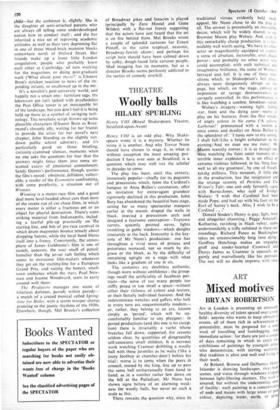THEATRE
Woolly balls
HILARY SPURLING
Henry VIII (Royal Shakespeare Theatre, Stratford-upon-Avon) Henry VIII is an odd play. Why Shake- speare wrote it is a mystery. Whether he wrote it is another. And why Trevor Nunn should have chosen to stage it, in what is without exception the most amazing pro- duction I have ever seen at Stratford, is a question which may well vex the scholar in decades to come.
The play has been, until this century, immensely popular—chiefly for its pageants and processions which, from the Cardinal's banquet to Anne Bullen's coronation, offer an invitation for extravagant grandeur rigorously declined in this production. John Bury has abandoned the beautiful bare stage, setting for so many spectacular masques earlier in the season, draped the walls in black, insetted a proscenium arch and designed a fearsome contraption—Toytown turrets, quaintly pointed eaves, lights twinkling in gable windows—which dangles insecurely at the back. Insecurity is the key- note of Mr Nunn's production : one has throughout a vivid sense of princes and potentates menaced, not so much by dis- grace or the block, as by the difficulty of remaining upright on a stage• with what looks like a gradient of one in six.
The costumes are doubtless authentic, though worn without confidence ; the group- ings recall the artificiality of Jacobean por- traits—the sense of too many people too stiffly posed in too small a space—without either their richness of colour and texture, or their fiercely individual features. And the indeterminate wenches and gaffers who lurk at every turn are unquestionably modern— or, rather, they belong to an era, known simply as 'period', which will be un- comfortably familiar to any playgoer : in period productions (and this one is no excep- tion) there is invariably a varlet whose breeches fall down, supported, for reasons seldom clear, by quantities of disagreeably self-conscious small children. It is nervous work watching Cranmer dribbling a woolly ball with these juveniles as he 'waits ('like a lousy footboy at chamber-door') before his trial ; worse is to come when the peers in council, routed by the king, line up to pass the same ball embarrassedly from hand to hand, as in a number rather low down on the bill at the Palladium. Mr Nunn has shown signs before of an alarming weak- ness for woolly balls, but never on such a scale as this.
There remains the question why, since its
traditional virtues evidently held small appeal, Mr Nunn chose to do the play at all. The answer is presumably an irresistible desire, which will be widely shared, to see Brewster Mason play Wolsey. And, es en in this remarkably cheap production, it is for- midably well worth seeing. We have no other actor so magnificently equipped to express a sense of absolute, inexorable, even placid power ; and probably no other actor who could accomplish, with such technical and imaginative brilliance, the scene of Wolsey's betrayal and fall. It is one of those tran- sitions which, in Shakespeare's last plays, always seem dangerously abrupt on the page, but which, on the stage, cons ey an impression of savage destructiveness as savagely controlled. In this performance, it is like watching a sombre, ferocious sunset. Wolsey's imagery—waning light, falling star, frost and the dying year—seems to play on his features, from the first streaks of angry colour in his curse CA spleeny Lutheran!' pronounced with a venom at once comic and deadly) on Anne Bullen to the splendour of: 'I haste now to my setting. I shall fall/Like a bright exhalation in the evening/And no man see me more'. Mr Adason scarcely moves ; it is as though one re watching the faint outer tremors of a terrible inner explosion. It is an effect of extreme violence followed, in his 'long fare- well to all my greatness', by one of breath. taking stillness. This moment, if little else in the production, has the resignation and the strange serenity of Pericles and The Winter's Tale; one can only fervently agree with Burne-Jones, who said of Irving's Wolsey: 'I wish that Cardinal had been made Pope, and had sat with his foot on the Earl of Surrey's neck. Also, I wish to be a Cardinal . .
Donald Sinden's Henry is gay, light, brisk and altogether charming ; Peggy Ashcroft's Katharine, ravishing in black velvet, seems understandably a trifle subdued in these sur- roundings. Richard Pasco as Buckingham takes an unconscionably long time dying Geoffrey Hutchings makes an engaging. gruff and tender-hearted Cromwell and Ernrys James as Cranmer is uncouth, un- gainly and marvellously like his portraits. The rest will no doubt improve with time.


































 Previous page
Previous page